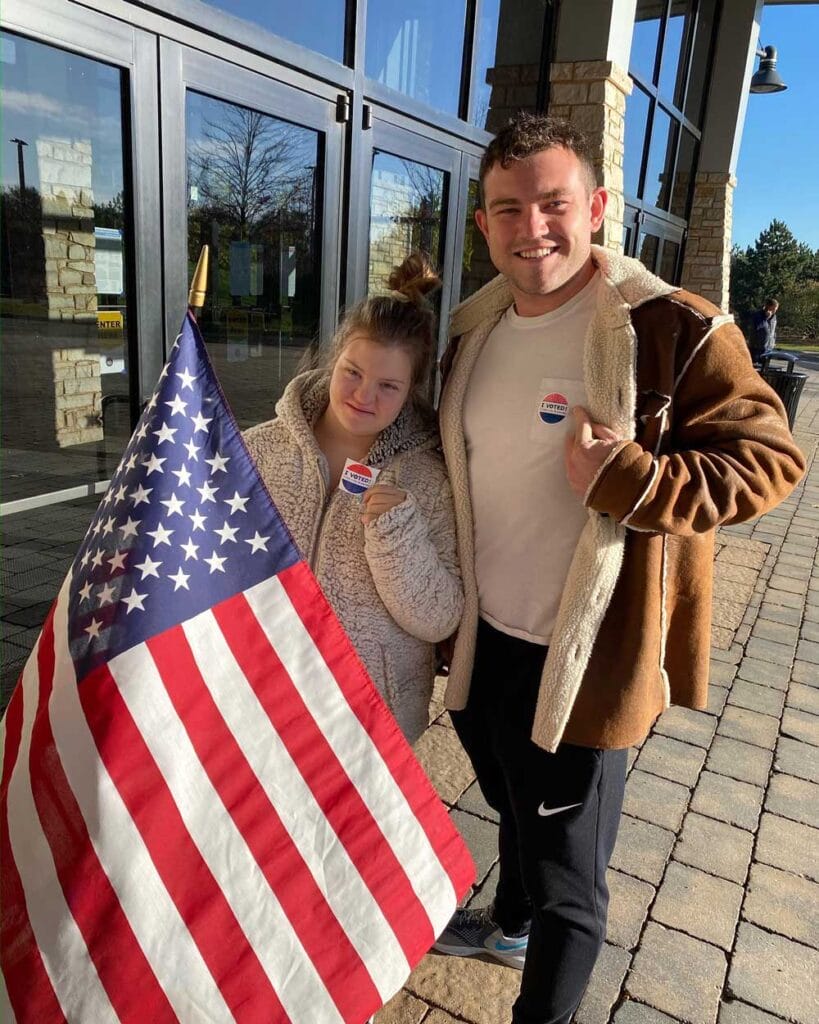MYTHBUSTING: Can People with Down Syndrome Vote?
(“Myth-busting” is a new multi-part blog series where we tackle all things Down syndrome: misconceptions, half-truths, and fabrications. We’re setting the record straight, once and for all.)
“Rock the vote.” “Let your voice be heard.” Your vote matters.”
As Americans, we’ve all heard these sayings again and again, especially during election years. Voting allows us to weigh in, be heard, and exercise our democratic rights. Yes, our world is more polarized than ever, and yes, politics is inherently divisive, but the right to vote is something central to all Americans. No matter how divisive politics can become, as American citizens, we remain united in the fact that we all have the right to vote.
…or do we?
By the letter of the law, any American citizen who is 18 years old or above can vote, but there’s still a question of whether EVERY citizen can truly vote. Sure, most of us know that people can lose the right to vote by being convicted of a felony. But beyond that, many question if those with intellectual disabilities have the right to vote.
Specifically, some people wonder ‘can people with Down Syndrome vote?’
Though there should be an easy answer to this question, in today’s world nothing comes easily, including answers. The internet is full of confusing, misleading, and downright false information; it’s hard to know what’s fact or fiction. So, without further ado, let’s get into it.
THE QUESTION: CAN PEOPLE WITH DOWN SYNDROME VOTE?
To cut to the chase, the answer to this question is YES! People with Down syndrome can absolutely vote, and they do!… Great, so we’re done here, right?
… Well, not exactly. Though this answer should be simple because, again, people with Down syndrome can and DO vote, unfortunately, like most things involving public policy, legislation, and politics, the answer is not ALWAYS that simple. But to truly break down this question, we must examine what people mean when they ask if people with Down syndrome can vote.
This question has two main components: a legal component and a cognitive component. First, people often ask this question from a legislative perspective. Specifically, they want to know if any laws or regulations stop or prevent people with intellectual disabilities from voting.
But there’s another part to this question. When people ask if individuals with Down syndrome can vote, many times, they’re questioning the ability, intellect, and capabilities of people with Down syndrome. Specifically, they’re calling into question whether people with Down syndrome can understand the task at hand, grasp political issues, step into the voting booth, and knowingly cast their vote.
Luckily, the answer to this latter part of the question IS simple. So, let’s set the record straight…

The COGNITIVE Component
YES! In fact, it’s a resounding yes. People with Down syndrome are more than capable of voting, and like any other American citizen, they have every right to be heard from when it comes to local, state, and national elections!
There’s a misconception in society that people with Down syndrome or any other intellectual disabilities are unable to form their own opinions, but this couldn’t be further from the truth. People with intellectual disabilities are deeply affected by public policy, and like anyone else, they deserve to be heard.
They are more than capable of understanding issues and coming to their own conclusions. Yes, at times, specific accommodations must be made to ensure individuals with disabilities can successfully cast their vote, but thanks to legislation, such as the Americans with Disabilities Act (ADA), individuals with disabilities have a right to those accommodations!
Now that we’ve settled that people with Down syndrome have the capacity to vote, it’s time to dive into whether states grant them the right to vote…
The LEGAL Component
Again, the answer is a resounding YES. Individuals with Down syndrome can legally vote. While laws vary from state to state, by and large, they have the right to vote, and having Down syndrome or any intellectual disability does not strip them from this right!
That being said, there are a few states where it’s not as easy for individuals with Down syndrome to vote as it should be. In some cases, parents of children with Down syndrome choose to take guardianship of their child when they turn 18, keeping the parents in control of financial and other major life decisions.
Though guardianship is an individual family decision, it can have ramifications on voting. In a small minority of states, guardianship can disqualify an individual from their right to vote. Despite this, work is being done to ensure that all individuals with intellectual disabilities are able to keep their right to vote!
Casting the Vote (Wrapping it up)
Now that we’re clear that individuals with Down syndrome can and do vote; it’s important to note that we, as a society, need to ensure that we make voting as easy as possible for them. Individuals with disabilities deserve to be heard, and we need to ensure that complicated registration laws or other ordinances do not keep them away from the voting booth.
Beyond this, on a social level, we need to talk to people with intellectual disabilities about voting. Often, people purposely don’t talk about voting with individuals with Down syndrome because they assume they can’t vote, but this is FALSE and harmful. Though no one means any harm, excluding individuals with Down syndrome from conversations like this further perpetuates the isolation and loneliness they and the entire disability community experience.
However, individuals with Down syndrome and other disabilities are an integral part of our society. Just like anyone else, they have civic duties, as well as basic rights!
Though the polarization of politics may not subside any time soon, we can take solace in the fact that we all share the right to vote. Individuals with Down syndrome may need accommodations or assistance to cast their vote but make no mistake, they are no exception, and they have every right to vote!




If a person can not manage their own meds, money, meals, any health care decisions and need staff to do everything for them how can they vote? They’re unable to make any decisions!!! But they can Vote! Ha this needs to change!!!